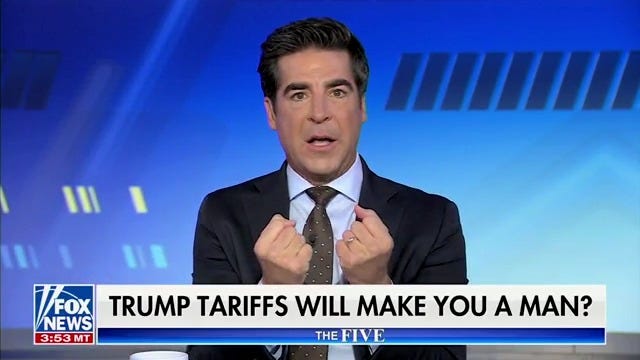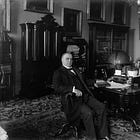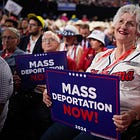How the “pink tariff” hurts women
Trump's trade war makes being a woman, and especially a Black woman, much more expensive.
💯 This special Sunday edition of Public Notice is made possible by paid subscribers. If you appreciate our fiercely independent coverage of American politics, please support our work by clicking the button below and signing up for a paid subscription. 💯
"Trump Tariffs will make you a man?" wondered a Fox News chyron as host Jesse Watters spoke days after Trump’s announcement of his “liberation day” tariffs.
It would be funny if there were no implications for different groups given how the American economy is currently structured. But the irony of "manly tariffs" is that in many ways, tariffs highlight how deep the economic inequalities are between women and men, and how those gender differences cut across racial lines.
As the author of the forthcoming “The Double Tax” — a book that takes a hard look into how costly it is to be a woman in America, why the bill runs higher for women of color, and what we ought to do about it — I have come to learn that women are simply charged more for existing, and thus, we incur a financial premium in virtually every aspect of life. This is because our world, designed by and for men, forces us to shoulder costs in order to adapt. President Trump’s recent imposition of stiff and senseless tariffs is no exception.
Tariffs are broadly defined as tax to be paid on imports or exports. Over the last year, they’ve become a big part of the economic conversation given Trump’s fixation on them as part of his desire to make the economy resemble a protection racket. Despite economists pushing back on their efficacy given how much they’ll raise costs for everyday Americans, he’s remained steadfast and announced new and higher tariffs just about every week — including during his most recent speech on Friday, when he gave away the game that there is literally no process to any of this beyond the half-baked thoughts flitting through his head.
According to CNBC, as of two weeks ago, the tariff rate on Chinese goods was closer to 40 to 70 percent, down from Trump’s rates in April, but still significantly higher than last year. Among the goods subject to Trump’s new tariffs are women’s bathing suits, shoes, and baby dresses. That’s why when tariffs went into effect, I immediately thought of another tax women face: the pink tax.
The pink tax is the extra price women pay for products that are also marketed to men — think shampoo or clothing. Back in 2015, the New York City Department of Consumer Affairs found that across five industries, women were paying more for everyday products than men:
7 percent more for toys and accessories
4 percent more for children’s clothing
8 percent more for adult clothing
13 percent more for personal care products
8 percent more for senior/home healthcare products
Although recent evidence suggests that the pink tax doesn’t apply to every product, it was already more expensive to import items for women than it was for men. Experts have dubbed this the “pink tariff.” As of 2022, US clothing tariff rates were more than three percentage points higher for women (16.7 percent) than they were for men (13.6 percent). When I heard the news that more tariffs were on their way, my immediate thought was the following: Being a woman in America is about to get a whole lot more expensive, especially because of the beauty industry.
You may not realize it, but much of the beauty industry relies on imported products. Korean skincare products, popular makeup brands, and hair extensions all feed into modern beauty standards. All of these products also rely on the global supply chain. Thus, with the existing pink tax and the new pink tariffs on these products, women will bear the brunt of Trump’s trade war.
While some might argue that women should simply stop buying imported beauty products, the data suggests that’s not as simple as it sounds. Beauty is associated with higher pay and better quality of life. Did you know that the attractiveness of parents can be predictive of how much their children will earn over their lifetimes? One study found that one standard deviation in parent’s looks can generate an additional $2,300 in annual earnings for their kids.
Women are penalized for not subscribing to beauty standards through social, political, and economic means. As a result, for many of us, beauty is not something we can afford to ignore. Higher tariffs only make the cost that comes with looking good increase — and that price becomes much steeper across racial lines. This is the double tax at work.
For Black women, hair products and hair extensions at the beauty supply stores we frequent are often stocked to the brim with imported goods from Asian countries, especially China. In recent weeks, several outlets have reported that beauty supply stores stocking braiding hair, wigs, and weaves used for coily and curly hair are expecting to significantly increase their prices.
The cost of braided styles is already skyrocketing. I recently paid $350 for mine — on the lower end of the spectrum. Braids are often used by Black women as a hairstyle that helps mitigate potential discrimination we face because of our natural hair. With tariffs in place, that means not only could the cost of braiding hair increase, but the cost of the service could also go up because hairstylists will have to offset the additional costs they are facing by upcharging their clients.
Consider this: Black consumers already travel farther to access hair and beauty products. On average, Black consumers travel 3.36 miles to a specialty beauty store, compared to 2.78 miles for white consumers. When we arrive, Black consumers are much less likely to find products that meet our needs. If a Black hair product costs $10 to import and the beauty supply store doesn’t absorb the new 40 percent (or more) tariff, suddenly you're paying at least $14 for it.
What these tariffs make clear is that what happens to women of color inevitably impacts everyone. Anyone who uses makeup, invests in hair care, or maintains a skincare routine will be hurt by Trump’s trade war. The downside of tariffs goes far beyond the stock market or prices at Walmart. It’s about equity and who ultimately bears the cost of an economic crisis. And as the data shows, women, especially Black women and girls, will once again be left feeling the pain.
Stay connected with Anna Gifty on Bluesky and Instagram, and pre-order her upcoming book “The Double Tax” everywhere book are sold here.
That’s it for today
We’ll be back with more tomorrow. If you appreciate today’s newsletter, please support our work by signing up. Paid subscribers make Public Notice possible.
Thanks for reading, and for your support.






I have to admit that I hadn't specifically thought about this. I know that women pay more for many items. When my daughter was little I bought T-shirts for her in the boys' department because they were less expensive. Once she was old enough to realize what I was doing she wouldn't wear the boys' T-shirts (we are so overly gendered). But, I never thought about the additional cost for Black women, even though Black women have always paid additional costs.
This has raised my blood pressure! Like Patricia I vaguely knew it but to have it spelled out like this is infuriating!